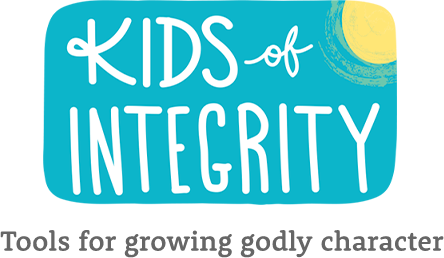Parents’ guide
If you’ve been wondering how to begin developing your child’s character, or if your past efforts haven’t been as successful as you’d hoped, we’re excited that you’re checking out Kids of Integrity.
Suitable for ages three to ten, Kids of Integrity is designed for maximum kid appeal! Each lesson features Bible-based discussions plus crafts, games and object lessons from science, nature and even home cooking.
As you may already suspect, this is not a “once-a-day-around-the-table” approach to building godly character. Kids of Integrity is a diverse selection of ideas for kid-captivating experiences that can take place in the car, in the park or wherever you happen to be. The goal is to bring Jesus into every aspect of your family’s life and make spiritual formation an integral part of your children’s daily routine.
Families particularly appreciate Kids of Integrity’s inherent flexibility. You tailor the lessons to suit your children’s unique needs and interests, and your family’s busy schedule. Whether you decide to do a little or a lot, what’s important is that you have begun intentionally encouraging your kids to be their best for Jesus.
You don’t have to be “super spiritual” to use Kids of Integrity effectively. What does matter, however, is that you recognize that God is the only One who can bring about lasting change in your children. For this reason, we encourage you to make prayer a priority as you select lesson ideas, prepare yourself to present each lesson, and work through each activity with your children. You’ll find plenty of sample prayers in each Kids of Integrity lesson to guide you.
First, prayerfully decide which character attribute you should focus on. Ask God to help you determine which dimensions of His character He would like to see developed in your children. Then read through the lesson ideas provided for that particular attribute. Note that you don’t need to cover all the content provided. Rather, each lesson presents a “smorgasbord” of ideas for you to pick and choose from. Just select the activities, stories and memory verses that will be most relevant, interesting and age-appropriate for your children.
Many families find that a week is about the right length of time to spend on a single attribute, but some families extend the lesson over a longer period. Monitor your children’s interest level, moving on before it begins to decline.
Each character trait lesson has twelve different components which are explained further below. We recommend that you commit yourself and your children in prayer first, then compile your lesson plan. It’s also a good idea to focus on the memory verse, Bible stories and kick-off craft early in your lesson. The remainder of the lesson components can be completed in any order.
Planning tools
Every character trait lesson provides two blank planning cards. As you review the idea options for each lesson, use a planning card to note the ones you would like to try. This will be your framework for your lesson and serves as a reminder during the week. Use either the point form or calendar form of the planning card – whichever suits your needs best.
Parents’ prayer
The parents’ prayer section will help you make personal prayer your priority. At the start, and throughout each lesson, pray that God will work in your children through your lesson activities. Aim to regularly pray through the parents’ prayer of your choice, or use these ideas as a guideline for your personal prayer.
Kids talk with God
The kids talk with God section will help kids learn to pray and to invite the Holy Spirit to help them change their attitudes and actions. As problems come up during the day, suggest talking to God about them.
Speak a blessing
Changing old habits is hard work, and your child will need encouragement. This section will remind you to affirm your child when you see him or her choosing God-honouring actions.
Memory verses
We suggest that you choose at least one verse of Scripture to memorize early in your lesson. Aim to review it at least once every day.
Kick-off craft
Once you have selected your memory verse, try to complete the kick-off craft early in the course of your lesson, since the activity is a good way to introduce your chosen character attribute. The resulting artwork will provide a focal point and a reminder of your theme for the remainder of your lesson.
Bible stories
As you read your preferred Bible story, try to bring the story to life for your children. Here are some ideas you can try:
- Use toys to act out the story. Then, have your kids act out the story themselves as you read it once more.
- Select one or two props for an object lesson. For example, have each child hold a rock as you read about hard-heartedness.
- Read with exaggerated expression, projecting intense excitement or quiet tenderness, as appropriate.
- Try different times of the day for your Bible story. Kids who are tired at bedtime may quickly forget the details.
Creative discipline
Even young children need to be taught the truth about sin and its consequences, and the rewards God promises for those who repent and make better decisions in the future. The Scripturally-based ideas in this section will help you convey the message, “I love you and God loves you, but we cannot put up with your sin.” They’ll also help you to ensure your child understands what they did wrong, and to stress forgiveness and affirmation.
Hands-on options
The activities listed in the hands-on options section help you turn everyday situations and tasks into fun, creative lessons for your children. Every lesson presents at least eight hands-on options for you to choose from; some lessons have many more. If you are viewing lesson content on the website, you can filter the hands-on activities if you wish. For example, you can filter the hands-on options to view only “physical activities.” (Filtering capability is not available within the PDF provided for each lesson.)
Recommended resources
Each character trait lesson includes a list of books, DVDs and CDs you may wish to use to reinforce the trait you are studying. Of course, there are many such resources available, but you can be confident that the titles in this short list convey messages that are consistent with Biblical truth. If you are viewing the lesson content online, you’ll find the list of recommended resources on the lesson contents page.


